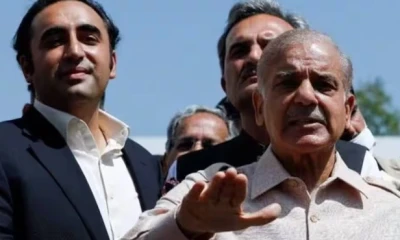In a significant breakthrough, Pakistan’s two longstanding political factions have reached an agreement to form a coalition government, breaking a nearly two-week deadlock following the country’s contentious election. This deal, likely to sideline Imran Khan’s party despite its electoral success, was sealed at a midnight meeting between Shehbaz Sharif and Bilawal Bhutto Zardari.
Addressing the media in Islamabad close to midnight local time on Tuesday, Bilawal Bhutto Zardari announced the Pakistan Peoples Party (PPP) would enter into a coalition with the Pakistan Muslim League-Nawaz (PML-N), led by the Sharif clan. Under the agreement, Shehbaz Sharif is slated to assume the role of Prime Minister, while Bilawal’s father, Asif Ali Zardari, will be nominated for the presidency.
Asserting the numerical strength of their alliance, Bilawal Bhutto Zardari, 35, son of the late former premier Benazir Bhutto, expressed confidence in their ability to form a stable government. This development brings an end to days of uncertainty following the inconclusive election on February 8, wherein Imran Khan’s party emerged with the most seats but failed to secure an outright majority.
The announcement has sparked interest among investors, who are keenly observing its implications on Pakistan’s markets, which have been volatile since the polls. While the benchmark stock index has witnessed a decline, dollar bonds have experienced an uptick following the coalition announcement.
However, questions linger regarding the response of Khan’s supporters, particularly in light of their allegations of vote-rigging. The Pakistan Tehreek-e-Insaf (PTI) party, through social media, has labelled the coalition leaders as “Mandate Thieves,” indicating potential resistance to the new government.
The upcoming administration faces formidable challenges, including addressing the country’s soaring inflation rate, negotiating a new loan with the International Monetary Fund, and implementing economic reforms. Shehbaz Sharif has underscored these priorities, emphasizing the need for concerted efforts to overcome these hurdles.
This collaboration between the Sharif and Bhutto families isn’t unprecedented. Previously, they formed a coalition government following Imran Khan’s ouster in April 2022. During that tenure, the parties cooperated, albeit with some differences, in governing the country for about 16 months.
As Pakistan braces for a new chapter in its political landscape, the alliance between these two influential families marks a pivotal moment in the nation’s democratic journey, with the promise of stability and progress on the horizon.

















